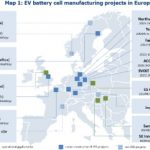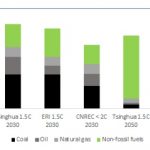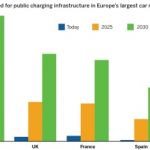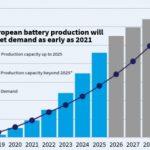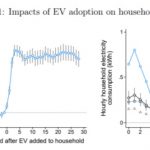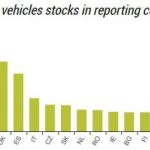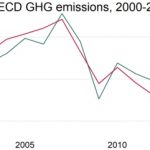Policies like the “green” labelling of EV batteries would give a significant advantage to European manufacturers, as well as accelerate the cleaning up of the supply chain. EU firms are better than most foreign battery manufacturers at monitoring and reducing emissions, writes Carole Mathieu at the IFRI Centre for Energy & Climate, referencing her report “Green Batteries: A Competitive Advantage for Europe’s Electric Vehicle Value Chain?” The … [Read more...]
A carbon tax on car fuel? A fossil car phase-out date is more effective
The EC is working on a carbon tax on car drivers as part of its big climate plan review in June. William Todts at T&E warns that the EC shouldn’t make the same mistake French President Macron made back in 2018 when severe gilets jaunes protests against a fuel price hike made him back down. A very high carbon price, decided by the market, may have the same effect, getting us nowhere. Instead, Todts gives his three point plan. The carbon tax … [Read more...]
China: decoupling GDP growth from rising emissions
To set up this week’s important online event (Tuesday 13th & Wednesday 14th April) “China: Carbon Neutral by 2060 -EFFICIENCY FIRST” we have an overview of China’s energy transition. Everyone agrees its performance is critical for the world to achieve the global goal of limiting warming to 1.5C by 2050. China made significant progress in 2020 with policy frameworks, renewable capacity additions and EVs, but it also added 38 GW of new … [Read more...]
Understanding battery costs better: Li-ion costs have dropped 97% in 30 years
There are two revelations here. First, quite how dramatically lithium-ion battery costs have dropped since 1991 – by 97%. Second, that nobody has been able to agree on how big that drop has been. But agreement on that number – and an established procedure to therefore make good forecasts - is vital for policy makers and related clean energy players. They need to know how much of a role batteries can play in the electrification of transport as … [Read more...]
Case studies: Strategic EV funding starts with an Essential Charging Network
Building a nationwide EV charging network is a daunting prospect. Camille Kadoch and Julia Hildermeier at RAP look at those places that are being strategic about it, starting with an essential network that will allay the concerns of consumers on the verge of buying an EV but put off by worries that they will get stuck somewhere with a flat battery. That’s frustrating, given the average American drives only 37 miles a day and Europeans 32 … [Read more...]
For energy security and waste reduction, EV battery manufacture in Europe is on the horizon
Europe should have sufficient battery manufacture capacity for all its EV needs, explains Sam Hargreaves at T&E. Their report shows that Europe will not only achieve that capacity target this year itself, but has the ability to keep it up as EV sales continue to grow (460 GWh in 2025 and 700 GWh in 2030 of battery production in Europe). The report also stresses the major benefit of reduced waste. If manufacturers hit EU recycling targets, EV … [Read more...]
Are EV owners driving less than we thought?
Research from California, the EV leader in the U.S., suggests that EV owners drive their vehicles half as much as the average gasoline car owner. Catherine Wolfram at the Haas School of Business explains that their research project reveals mileage data is so hard to gather that it’s difficult to know what’s actually going on. Is the data wrong (they don’t think so), or are EVs only being bought by drivers who don't use a car much? If so, the … [Read more...]
Essential energy transition metals: “Eco-friendly” trawling of ocean floor could replace land mining
The availability of metals for raw materials has a make-or-break impact on the future of EVs, wind turbines and many other energy sector applications. The world needs 3bn EVs and 10tn kWh/yr more clean energy by 2040 to have any chance of achieving our climate goals. We need so much more that recycling what we already have won’t make a noticeable difference. Mining on land already has very serious negative environmental and social consequences. … [Read more...]
EU, U.S. exploring new sources of Rare Earth Minerals, should China limit exports
Reports are emerging that China is considering the restriction of the export of rare earth minerals, as a result of tensions with the U.S. Given China controls around 80% of global supply it would have severe consequences for not just advanced military applications (the presumed primary target) but also clean energy technologies like EVs and wind turbines. However, if the threat is carried out, Lukas Trakimavičius explains how this could backfire … [Read more...]
Oil’s decline will weaken its political influence
2020 was another bad year for the oil and gas industry. The pandemic made it worse but it was not the cause: a decline has been going on for a long time. Energy firms in the S&P 500 (overwhelmingly oil and gas) make up 2.3% of the total value, down from 16% just over a decade ago, and 30% forty years ago. Clark Williams-Derry and Tom Sanzillo at IEEFA explain why, how and what the likely consequences are for oil firms. For many years it’s … [Read more...]
E-mobility in Germany: a record year but still way off target
In the past few months Germany has seen record levels for electric car registrations. But will this rising trend be enough to meet the government’s target of 10 million electric cars by 2030? To answer the question Naemi Schink and Simon Göss at Energy Brainpool look at the data, proposed new regulations, and funding. Though the number of electric cars has grown by over 360% in the last year there are currently only 240,000 EVs and 200,000 … [Read more...]
Clean Trucks are coming: a review of battery, hydrogen, synthetic fuels and more
New EU fuel efficiency rules are forcing truck makers into a race to get their low emission vehicles onto the roads. From 2025, newly registered trucks must have 15% lower emissions, and from 2030 it’s 30%. Battery-electric drivetrains are most likely to dominate, assisted in their evolution by the assured progress and charging infrastructure of EVs. Hydrogen fuel cells and synthetic fuels are also in the game, though hindered by the inevitable … [Read more...]
We’re making much more progress decarbonising Electricity than Transport. Why?
In the OECD, since 2000, electricity sector emissions have fallen by 8% while transport emissions have actually increased by 5%. The best performers like the UK recorded drops in both: 40% and 6% respectively. In the U.S. it’s 25% and 0%. Catherine Wolfram at the Haas School of Business asks why transport is still going in the wrong direction, given the power sector’s progress. She posits three theories. Rich nations are outsourcing … [Read more...]
Nine advantages small-scale solutions have for reducing global emissions
Which is best? Spending your budget on a million 1 KW solar panels or a single 1 GW nuclear/hydro/gas plant? Lots of electric bikes or a single tram system? Lots of smart thermostats or whole-building retrofits? Charlie Wilson (University of East Anglia), Caroline Zimm (IIASA) and Simon De Stercke (Imperial College London) summarise their study that lists the advantages of small-scale “granular” solutions over large-scale “lumpy” ones. Granular … [Read more...]
Biofuels vs Hydrogen: which can fuel aviation, shipping, trucks?
The positive signals coming from EV sales and charge points contrast with the lack of progress in finding alternative fuels for aviation, shipping and trucks. Cornelius Claeys runs through the prospects for biofuels and hydrogen to power long-haul transport. Biofuels are already used as a substitute for fossil fuels, and EV uptake will usefully free them for fuelling heavy transport. But as decarbonisation ambitions rise the pressure on scarce … [Read more...]
- « Previous Page
- 1
- …
- 6
- 7
- 8
- 9
- 10
- …
- 12
- Next Page »


